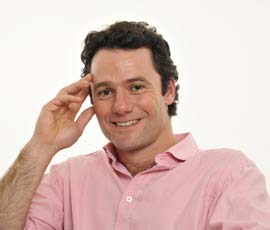OPINION: Farming ministers have a tougher job than most, says Ian Pigott

I was saddened to learn that David Miliband will be leaving British politics to take a role with the International Rescue Council. Westminster will be a poorer place for his absence.
He was an excellent secretary of state for agriculture. During his all too brief time at the helm he always showed compassion, intellect and an ability to understand all things farming. No small achievement when one considers that prior to taking up the post, the closest he came to farming was watching it whistle past the window of the train when travelling from his North London home to his constituency in South Shields.
Although my political ambitions were extinguished shortly after I married (Mrs P promised to divorce me if I went into politics), I have always been intrigued by the goings on in Westminster and particularly the paths of those politicians who oversee farming.
Growing up, I saw the role of Minister of Agriculture as a recognition of the incumbent’s potential, a stepping-stone to a higher calling. During the Thatcher years, political heavyweights such as Heseltine, Howard and Ken Baker all headed up MAFF before going on to senior office. But when I returned to the farm in the mid-90s things changed. John Gummer was packing his bags back to Norfolk. And under Tony Blair’s leadership, “farming” had been replaced by “rural affairs”, which was famously referred to by Margaret Beckett as “Deathra” on account of its ability to end careers. During those years it was difficult to tell who detested farming more, Jack Cunningham, Cherie Blair or Margaret Beckett.
But bar the odd exception, farming has been blessed with some excellent politicians.
I have the utmost respect for Nick Brown and Hilary Benn. Agriculture is an exceptionally difficult ministry. Farmers are acutely critical and opinionated on the subject of politics. Moreover, many are carnivorous homophobes and both Brown and Benn overcame those prejudices to be highly regarded. Well done, them.
But what of the future? I am not sure that farming wants to return to the days of being a grooming parlour for Number 10. Strength and continuity within DEFRA must be of benefit. At long last agriculture is being recognised as a leg of a stool for the future stability for the country.
But I am concerned that the catatonic fiscal debt that our country is saddled with will take decision making of more and more key issues such as CAP reform and coastal defences out of the hands of Owen Paterson’s team in DEFRA and into Number 11. In the Treasury, I am told, farming is only seen as a number on a list of debtors and not for its value in delivering food security and environmental stewardship.
The Treasury should remember that farmers react well to politicians who show empathy. A skill shared by Miliband, Jim Paice, David Heath, Richard Benyon and Mary Creagh.
And although farmers show great resilience when faced with the adversity of volatile weather and markets as in years such as this, equally we can be a stubborn bunch when treated without due respect.
The days of Cunningham and Beckett were unpleasant and unnecessarily confrontational. We owe a great deal to David Miliband for repairing much of that damage and building the foundation of a much better relationship between farming and Westminster.
Stephen Carr runs an 800ha (1,950-acre) sheep, arable and beef farm on the South Downs near Eastbourne in partnership with his wife, Fizz. A third of the acreage is in conversion to organic status.
Read more from all our Opinion writers
